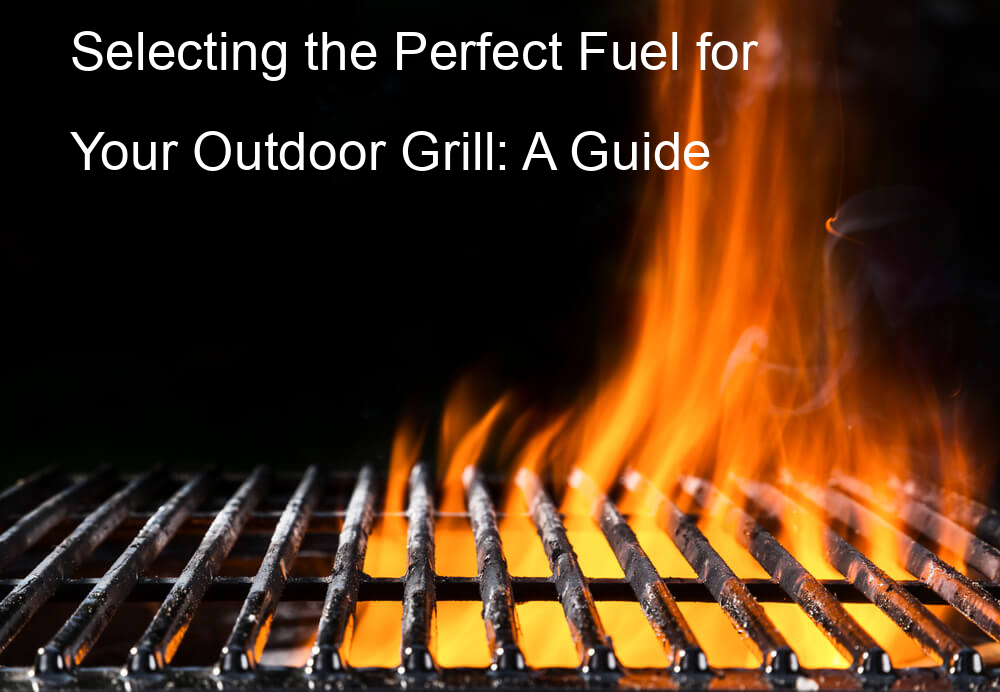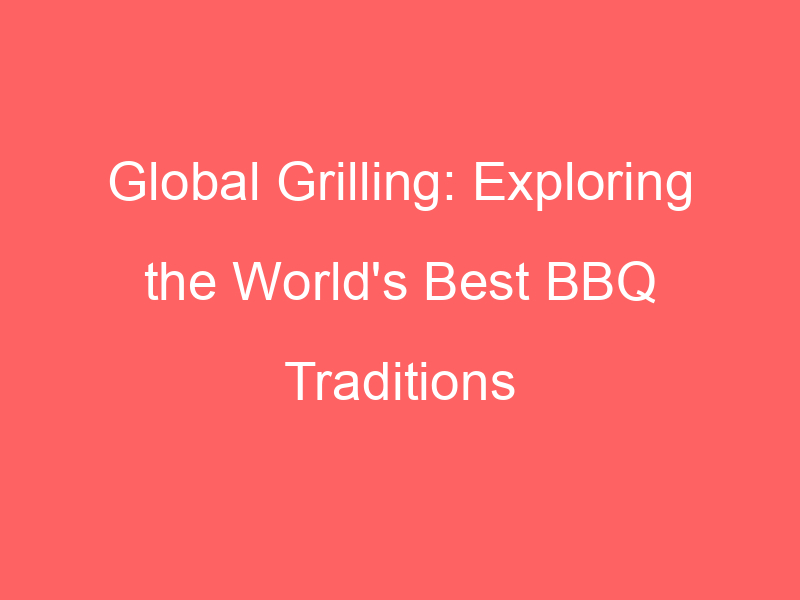Introduction to Outdoor Grill Fuels
Grilling is a beloved pastime for many, but the success of your barbecue doesn’t only depend on your grilling skills. The type of fuel you use can significantly affect the taste, cooking time, and overall grilling experience. In this section, we will explore the importance of choosing the right grill fuel and provide an overview of the common grill fuel options available.
- Understanding the Importance of Choosing the Right Grill Fuel
- Overview of Common Grill Fuel Options
- Charcoal: Known for providing a distinct smoky flavor, charcoal burns hotter than other fuels. However, it takes longer to heat up and can be messy to clean up.
- Propane: Propane grills are easy to use and heat up quickly. They provide a clean burn, meaning they don’t impart any additional flavor to the food.
- Natural Gas: Similar to propane, natural gas is convenient and easy to use. However, it requires a gas line, which can limit where you can place your grill.
- Wood Pellets: Wood pellets give food a unique, smoky flavor. They burn cleanly and are easy to use, but they require a special type of grill.
Selecting the right fuel for your grill is crucial for several reasons. First, different fuels can impart distinct flavors to your food. For instance, charcoal gives a smoky flavor that many barbecue enthusiasts love. Second, the fuel you choose can affect the cooking temperature and time. Some fuels burn hotter and longer than others. Lastly, the cost and availability of the fuel are also important considerations. Some fuels are more expensive or harder to find than others.
There are several types of grill fuels available in the market, each with its own advantages and disadvantages. Here are some of the most common ones:
Understanding the different types of grill fuels and their characteristics can help you make an informed decision about the best fuel for your grilling needs. In the next sections, we will delve deeper into each type of fuel, comparing their pros and cons, and exploring eco-friendly options.
Types of BBQ Grill Fuel
When it comes to BBQ grilling, the type of fuel you use can significantly impact the taste and overall grilling experience. One popular choice among grill enthusiasts is charcoal. Let’s delve into the world of charcoal grill fuel.
Charcoal Grill Fuel
Charcoal is a classic choice for BBQ grilling. It’s known for imparting a smoky flavor that many BBQ lovers crave. However, like any fuel source, it has its pros and cons.
-
Pros and Cons of Using Charcoal as Grill Fuel
Charcoal is praised for the rich, smoky flavor it imparts to food. It also reaches higher temperatures than other fuel types, making it ideal for searing meats. However, it takes longer to heat up and requires more cleanup than gas grills. Additionally, it produces more smoke, which might not be ideal for those with respiratory issues or in areas with strict smoke regulations.
-
Types of Charcoal: Lump Charcoal vs Briquettes
There are two main types of charcoal: lump charcoal and briquettes. Lump charcoal is made from pure, burned hardwood and tends to burn hotter and faster. It’s a favorite among professional chefs for its ability to sear meat and its subtle smoky flavor. On the other hand, briquettes are made from a mixture of wood and other materials, shaped into uniform pieces. They burn longer and more consistently than lump charcoal, making them a good choice for slow and low cooking.
Understanding the different types of BBQ grill fuel can help you make an informed decision and enhance your grilling experience. Whether you choose charcoal or another type of fuel, the key is to understand your needs and preferences, and to experiment until you find what works best for you.
Propane Grill Fuel
When it comes to grilling, the type of fuel you use can significantly impact the taste and overall grilling experience. One popular choice among grill enthusiasts is propane. Let’s delve into the benefits of using propane as grill fuel and some considerations to keep in mind.
- Benefits of Using Propane as Grill Fuel
- Quick Heat Up: Propane grills heat up quickly, reducing the waiting time before you can start grilling.
- Easy Temperature Control: With a propane grill, you can easily adjust the temperature, giving you more control over your cooking.
- Clean Burning: Propane is a clean-burning fuel, meaning it doesn’t produce a lot of smoke or leave behind residue that can affect the taste of your food.
- Availability: Propane tanks are widely available and easy to refill or exchange at many retail locations.
- Considerations When Using Propane Grill Fuel
- Safety: Propane is a flammable gas, so it’s important to handle it with care. Always check for leaks and store propane tanks in a well-ventilated area.
- Cost: While propane is readily available, it can be more expensive than other types of grill fuel like charcoal.
- Flavor: Some grill enthusiasts argue that propane doesn’t impart the same smoky flavor to food as charcoal or wood chips.
Propane grills are known for their convenience and efficiency. Here are some reasons why propane might be the right choice for your grilling needs:
While propane grills offer many benefits, there are a few considerations to keep in mind:
In conclusion, propane is a versatile and convenient option for grilling, but like any fuel source, it’s important to use it safely and consider its potential impact on your food’s flavor and your budget. For more information on propane and other types of grill fuels, check out the Wikipedia page on propane.
Natural Gas Grill Fuel
When it comes to grilling, the type of fuel you use can significantly impact the taste and quality of your food. One popular option among grill enthusiasts is natural gas. Let’s explore the advantages of using natural gas as a grill fuel and how to use it safely.
- Advantages of Natural Gas as a Grill Fuel
- Economical: Natural gas is generally cheaper than other types of grill fuels, making it a cost-effective choice for regular grillers.
- Convenience: If your home is already equipped with a natural gas line, you can easily connect your grill to it. This eliminates the need to refill propane tanks or buy charcoal.
- Consistent Heat: Natural gas provides consistent heat, which allows for even cooking and better control over the grilling process.
- Eco-friendly: Compared to charcoal and propane, natural gas burns cleaner, producing fewer pollutants and contributing less to greenhouse gas emissions. Learn more about natural gas here.
- How to Safely Use Natural Gas as Grill Fuel
- Proper Installation: Make sure your grill is properly connected to the natural gas line. If you’re unsure, hire a professional to do the installation.
- Regular Inspection: Regularly inspect your grill and gas line for any signs of damage or leaks. If you smell gas while the grill is off, turn off the gas supply and call a professional.
- Safe Distance: Keep your grill at a safe distance from your home and any flammable materials.
- Never Leave Unattended: Never leave your grill unattended when it’s on. Always turn off the gas supply when you’re done grilling.
Natural gas is a highly efficient fuel source for grilling. Here are some of its key benefits:
While natural gas is a safe and efficient fuel source, it’s important to use it correctly to ensure safe grilling. Here are some safety tips:
Charcoal vs Gas Grills: A Comparison
When it comes to grilling, the choice of fuel can make a significant difference. Two of the most popular options are charcoal and gas grills. Let’s dive into a comparison of these two types of grills.
- Comparing the flavor profiles of charcoal and gas grills
- Cost comparison: charcoal grills vs gas grills
- Convenience and ease of use: charcoal vs gas
One of the most noticeable differences between charcoal and gas grills is the flavor they impart to the food. Charcoal grills are known for their unique, smoky flavor. The charcoal, when heated, produces a rich, smoky aroma that permeates the food, giving it a distinct taste that many grill enthusiasts love. On the other hand, gas grills provide a cleaner, more neutral flavor. This allows the natural flavors of the food to shine through, making it a preferred choice for those who prefer a more subtle taste. Read more about grill flavors on Wikipedia.
When it comes to cost, charcoal grills are generally cheaper upfront. However, the cost of charcoal can add up over time, making it more expensive in the long run. Gas grills, on the other hand, have a higher initial cost but can be more economical over time, especially if you grill frequently. The cost of propane or natural gas is typically less than charcoal, and gas grills tend to be more energy-efficient.
Gas grills are generally considered more convenient and easier to use than charcoal grills. They heat up quickly, maintain a consistent temperature, and are easy to clean. Charcoal grills, on the other hand, take longer to heat up and require more effort to maintain the desired temperature. However, some grill enthusiasts enjoy the process and challenge of controlling the heat with a charcoal grill. It’s all about personal preference.
In conclusion, both charcoal and gas grills have their pros and cons. The choice between the two often comes down to personal preference, budget, and how much time and effort you’re willing to put into your grilling. Whether you prefer the smoky flavor of charcoal or the convenience of gas, both types of grills can provide a great outdoor cooking experience.
Eco-friendly Grill Fuel Options
As grilling enthusiasts, it’s important to understand the impact our choices can have on the environment. This includes the type of fuel we use for our grills. Let’s explore some eco-friendly alternatives that can help us enjoy our favorite pastime while also caring for our planet.
- Understanding the environmental impact of grill fuels
- Exploring eco-friendly alternatives for outdoor cooking fuel
- Solar grills: These grills use the sun’s energy to cook food, producing no emissions.
- Electric grills: When powered by renewable energy, electric grills can be a more sustainable choice.
- Biomass briquettes: Made from organic waste, these briquettes burn cleaner than charcoal.
- Natural gas: Although still a fossil fuel, natural gas burns cleaner than propane and is considered a more eco-friendly option.
Traditional grill fuels like charcoal and propane have a significant environmental footprint. Charcoal production contributes to deforestation and releases harmful pollutants into the atmosphere. Propane, although cleaner than charcoal, is a fossil fuel that contributes to greenhouse gas emissions. According to the Environmental Impact of the Energy Industry article on Wikipedia, the energy sector, which includes the production of grill fuels, is the largest source of greenhouse gas emissions worldwide.
Fortunately, there are several eco-friendly alternatives to traditional grill fuels. These include:
Choosing an eco-friendly grill fuel is a small step that can have a big impact on our environment. By making this choice, we can continue to enjoy grilling while also doing our part to protect our planet.
Case Study: Best Fuel for Grills in Different Scenarios
Choosing the right fuel for your grill can make a significant difference in the taste and quality of your food. Let’s look at three different scenarios and determine the best fuel options for each.
- Choosing grill fuel for a backyard BBQ
- Selecting grill fuel for a camping trip
- Deciding on grill fuel for a beach cookout
When it comes to backyard BBQs, convenience and control are key. Therefore, propane gas is often the best choice. It’s easy to use, heats up quickly, and allows for precise temperature control. Plus, it’s readily available at most grocery or home improvement stores. If you prefer a smoky flavor, consider using a smoker box with wood chips alongside your propane grill.
For camping trips, portability and ease of use are crucial. Charcoal grills are typically the best option. They’re lightweight, easy to pack, and don’t require a gas line or electricity. Plus, they give your food a delicious, smoky flavor that’s perfect for outdoor cooking. Just remember to pack enough charcoal and a safe way to light it.
When grilling at the beach, you need a fuel that can withstand the wind and sand. Charcoal is a good option because it burns hot and long, even in windy conditions. However, if you’re concerned about environmental impact, consider using a portable propane grill. They’re easy to clean and leave less waste behind.
In conclusion, the best grill fuel depends on your specific situation and personal preferences. Whether you’re hosting a backyard BBQ, going on a camping trip, or having a beach cookout, there’s a perfect fuel option for you.
Key Takeaways: Selecting the Perfect Fuel for Your Outdoor Grill
As we wrap up our discussion on grill fuels, it’s important to remember that the perfect fuel for your grill depends on your specific needs and preferences. Here are some key points to keep in mind:
- Recap of the different types of grill fuels and their benefits:
- Final tips for choosing the best fuel for your outdoor grill:
There are several types of grill fuels available, each with its own set of benefits. Charcoal, for instance, imparts a smoky flavor that many BBQ enthusiasts love. Gas grills, on the other hand, are easy to use and heat up quickly. Eco-friendly options like wood pellets are also gaining popularity for their sustainability and unique flavor profiles. For more in-depth information, refer back to our sections on Types of BBQ Grill Fuel and Eco-friendly Grill Fuel Options.
When choosing the best fuel for your grill, consider factors such as ease of use, flavor, cost, and environmental impact. If you’re new to grilling, gas or electric grills may be the easiest to start with. If flavor is your top priority, charcoal or wood pellets may be your best bet. Always remember to use your grill in a well-ventilated area and follow all safety guidelines. For a more detailed guide, refer to our Case Study: Best Fuel for Grills in Different Scenarios.
In conclusion, the perfect grill fuel is one that suits your grilling style, taste preferences, and budget. Happy grilling!






